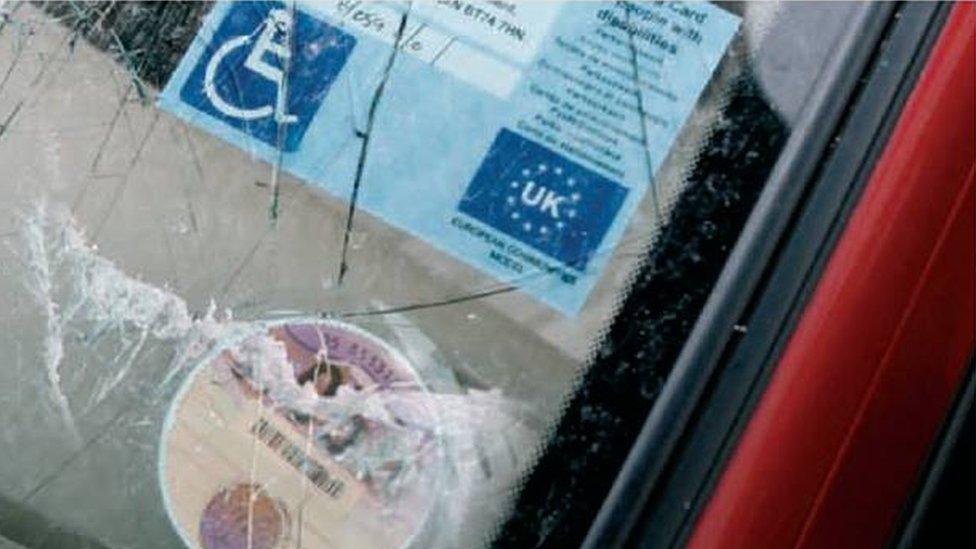Disability hate crime: New PSNI campaign after 44 reports in six months
- Published

Victims of hate attacks say they are hopeful the PSNI's online campaign will have an impact
An online campaign to stop disability hate crime has been launched after the Police Service of Northern Ireland recorded 44 attacks within six months.
The actual number of attacks is believed to be higher as many victims are hesitant to speak to police.
The crime is defined as "any incident perceived to be on the grounds of the person's physical or mental disability by the victim or any other person".
The PSNI has launched a Facebook campaign to help stamp out the attacks.
Victims of hate attacks have said they are hopeful it will have an impact.
'Voice'
Two years ago, the PSNI commissioned Leonard Cheshire Disability, a disability rights charity, to establish an advocacy service to help disabled people gain equal access to justice.
The service was the first of its kind in Northern Ireland and Eilis Mulholland from the charity said it has made significant difference.
"Often victims can be nervous about approaching police because of a fear of being misunderstood or not believed," she said.
"With us, they can speak freely and we can then act on their behalf."
Charity advocates make the initial contact with police to find out if the complaint has been recorded a hate-motivated crime.
They can then act as a go-between in police interviews, or to correlate police correspondence.
"The service provides a voice for disabled people if they need that kind of support," Ms Mulholland said.
'Upset'
Wheelchair user Michael Bailey has been the victim of disability hate crimes on several occasions.
"The first time I was crossing at the lights and I got a smack on the back of my head - I couldn't understand what it was for," he said.
"The second time I was passing trees, and bits of wood and stones were thrown at me from behind them."
Like many other victims, he did not report the initial incidents.
However, he eventually contacted police after an attack near his home in which youths tried to steal his wheelchair.
"Teenagers came up to the back of my wheelchair, calling me names, taking everything off me. I realised they wanted my wheelchair," he said.
He called the police later that night but was upset when, against his wishes, officers arrived in a marked car.
"I didn't want that. After they left, I was tortured again."
'Scared'
John Gillespie, who has a learning disability, was shopping in east Belfast when he was targeted by a teenage girl.
"I was minding my own business when she walked up to me and took my gold necklaces off my neck," Mr Gillespie said.
"I was scared because I didn't know what she would do."
He was particularly upset as one of the necklaces had been left to him by his late brother, Martin.
"She took advantage of me knowing I had a learning disability."
He reported the incident to police but felt his complaint was not taken seriously.
'Loyalty'
Ch Insp Emma Bond said the PSNI is keen to make the reporting of crimes as easy as possible, and that is why they commissioned the advocacy service.
"It's essential that victims feel able to report so that future attacks can be prevented," she said.
"I'm very conscious that disabilities aren't always visible so officers may be unaware of the specific needs."
Although most attacks are carried out by strangers, Ms Mulholland said the crimes can happen within a person's own home, perpetrated by members of their own community.
"Disabled people can be taken advantage of by people they know - people they trust," she said.
'Difference'
Ms Mulholland added that the PSNI, the Housing Executive and the Department of Justice have been working hard to end this kind of crime.
"Nobody should have to suffer in silence, least of all a vulnerable, disabled person," he said.
Disability hate crimes recorded by the PSNI have steadily increased since the advocate post was established.
Mr Gillespie said the service had made a big difference in his case.
"I felt somebody was there for me who wanted to listen. Without them, I don't think anything would have been done."